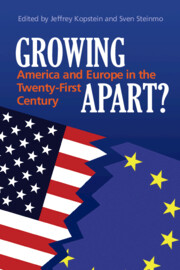Book contents
- Frontmatter
- Contents
- Contributors
- Acknowledgments
- Growing Apart?
- Introduction: Growing Apart? America and Europe in the Twenty-First Century
- 1 The Religious Divide: Why Religion Seems to Be Thriving in the United States and Waning in Europe
- 2 Value Change in Europe and North America: Convergence or Something Else?
- 3 On Different Planets: News Media in the United States and Europe
- 4 One Ring to Bind Them All: American Power and Neoliberal Capitalism
- 5 Spreading the Word: The Diffusion of American Conservatism in Europe and Beyond
- 6 Work, Welfare, and Wanderlust: Immigration and Integration in Europe and North America
- 7 Lost in Translation: The Transatlantic Divide over Diplomacy
- 8 The Atlantic Divide in Historical Perspective: A View from Europe
- Index
3 - On Different Planets: News Media in the United States and Europe
Published online by Cambridge University Press: 19 January 2010
- Frontmatter
- Contents
- Contributors
- Acknowledgments
- Growing Apart?
- Introduction: Growing Apart? America and Europe in the Twenty-First Century
- 1 The Religious Divide: Why Religion Seems to Be Thriving in the United States and Waning in Europe
- 2 Value Change in Europe and North America: Convergence or Something Else?
- 3 On Different Planets: News Media in the United States and Europe
- 4 One Ring to Bind Them All: American Power and Neoliberal Capitalism
- 5 Spreading the Word: The Diffusion of American Conservatism in Europe and Beyond
- 6 Work, Welfare, and Wanderlust: Immigration and Integration in Europe and North America
- 7 Lost in Translation: The Transatlantic Divide over Diplomacy
- 8 The Atlantic Divide in Historical Perspective: A View from Europe
- Index
Summary
Whenever a problem of sufficient magnitude and complexity presents itself, a standard twenty-first century response among policy makers is to blame the media. And why not? The press is clearly pervasive, supposedly influential, seemingly unaccountable, and, best of all, singularly inept at defending itself against attack. So when assigning responsibility for the current transatlantic divide, the news media present a tempting target. Have they quietly and ruthlessly been sowing the seeds of mistrust between Europe and the United States? Do they have an interest in fanning the embers of transatlantic anger, perhaps to build circulation or indulge the jingoism of some moss-backed proprietor? Have they been conspiring, from opposite sides of the ocean, to cook up this nasty, newsworthy conflict?
The short answer is possibly yes, to a limited degree, but not enough to matter. The news media, as we shall see, are too diverse and feeble to impose their will on the rest of us. Other questions seem more pertinent: Why do Americans and Europeans appear to hold such widely differing versions of what is happening in the world? Is the press to blame? There is no short answer to these questions. The long, complicated explanation has much to do with the war in Iraq. This is no surprise. But well before the United States arrived in Baghdad, there were factors driving U.S. and European opinion apart.
- Type
- Chapter
- Information
- Growing Apart?America and Europe in the 21st Century, pp. 80 - 108Publisher: Cambridge University PressPrint publication year: 2007



